biotechrabbit™ Taq DNA polymerase is a first-choice enzyme for all routine and molecular diagnostics PCR applications . The exceptional quality and purity of the enzyme ensures highest performance that is utilized by the diagnostics industry and research labs. The polymerase is suitable for standard and fast PCR applications giving high product yields from various templates with targets of up to 3 kb in size.
Taq DNA polymerase is a thermostable, highly processive 5'→3' DNA polymerase that has low 5'→ 3' exonuclease activity and lacks 3'→5' exonuclease (proofreading) activity. The latter allows incorporation of modified nucleotides.
The enzyme also exhibits deoxynucleotidyl transferase activity that results in the addition of extra A overhang at the 3'-ends of PCR products, allowing easy cloning of PCR products into vectors with T overhangs.
Info: Recommended annealing temperature is 2°C above primer Tm (use gradient PCR to check).
Component | Composition |
Taq DNA Polymerase | Taq DNA Polymerase, 5 U/µl, in storage buffer containing 50% (v/v) glycerol |
5× Reaction Buffer | Optimized PCR buffer without magnesium ions |
50 mM MgCl2 | 50 mM MgCl2 in water |
STORAGE | -30°C to -10°C (until expiry date – see product label) |
Unit Definition
One unit is defined as the amount of enzyme required to catalyze the incorporation of 10 nmol of dNTP into acid-insoluble form in 30 minutes at 72°C in the presence of the reaction buffer.
Quality Control
Functional assay
Human genomic DNA was amplified using the DNA Polymerase and specific primers to produce a distinct band of 750 bp.
Self-priming activity
Standard PCR is carried out without primers, using the DNA Polymerase and human genomic DNA. No products were amplified.
Exonuclease assay
Linearized lambda/HindII fragments are incubated with the DNA Polymerase in a 50 µl reaction mixture for 4 h at 37°C. No degradation of DNA was observed.
Endonuclease assay
lambda DNA is incubated with the DNA Polymerase in a 50 µl reaction mixture for 4 h at 37°C. No degradation of DNA was observed.
Nick Activity
Supercoiled plasmid DNA is incubated with the DNA Polymerase in a 50 µl reaction mixture for 4 h at 37°C. No conversion of covalently closed circular DNA to nicked DNA was detected.
E. coli DNA contamination assay
A sample of the denatured DNA Polymerase is analyzed with specific primers targeting the 16S rRNA gene in qPCR for the presence of contaminating E. coli DNA. No E. coli DNA was detectable.
Prevention of PCR contamination
When assembling the amplification reactions, care should be taken to eliminate the possibility of contamination with undesired DNA.
- Use separate clean areas for preparation of samples and reaction mixtures and for cycling.
- Wear fresh gloves. Use sterile tubes and pipette tips with aerosol filters for PCR setup.
- Use only water and reagents that are free of DNA and nucleases.
- With every PCR setup, perform a contamination control reaction that does not include template DNA.
Standard PCR setup
The standard PCR protocol using biotechrabbit reaction buffer provides excellent results for most applications. Optimization might be necessary for certain conditions, such as high GC or AT content, strong template secondary structures or insufficient template purity. In such cases, optimization of template purification (see biotechrabbit nucleic acid purification kits), primer design and annealing temperature is recommended.
The best conditions for each primer-template can be optimized with the following:
- Choosing the optimal quantities of template and primers
- Determining optimal concentrations of the enzyme and magnesium ions
- Optimizing cycling conditions
If unspecific amplification occurs, the amount of DNA Polymerase and the primer concentration can be reduced. Correspondingly, these can be increased when yield is low.
Optimizing magnesium concentration
Many applications use the standard concentration of 2 mM MgCl2. However, reactions with increased amounts of template (e.g., genomic DNA), primer and nucleotides might require higher MgCl2 concentrations (2–3 mM). A separate 50 mM MgCl2 solution is supplied with the enzyme and can be used to adjust the MgCl2 concentration according to the table below:
Final concentration of MgCl2 in a 50 µl reaction, mM | 2.0 | 2.25 | 2.5 | 2.75 | 3.0 |
Volume of 50 mM MgCl2 solution to add, µl | 2.0 | 2.25 | 2.5 | 2.75 | 3.0 |
Basic Protocol
- Thaw on ice and mix all reagents well, especially the MgCl2 solution and dNTPs.
- Keep all reagents and reactions on ice.
- When setting up multiple reactions, prepare a master mix of water, buffer, dNTPs and polymerase. Prepare enough master mix for one more than the actual number reactions.
- Pipet the master mix into thin-walled 0.2 ml PCR tubes.
- Add template and primers separately if they are not used in all reactions.
Component | Volume | Final concentration |
5X Reaction Buffer | 10 µl | 1× |
50 mM MgCl2 | Variable (standard 2 µl) | 2 mM |
| Higher than 2 mM MgCl2 might increase yield but reduce fidelity | |
10 mM dNTP Mix | 1 µl | 200 µM |
Forward primer | Variable | 0.2–1 µM |
Reverse primer | Variable | 0.2–1 µM |
Template DNA | Variable | 10 pg–1 μg |
| Use 0.01–1 ng for plasmid or phage DNA and 0.05–1 μg for genomic DNA | |
Taq DNA Polymerase (5 U/µl) | 0.5 µl | 2.5 U |
Nuclease free water | Variable |
|
Total volume | 50 µl |
|
- For total reaction volumes other than 50 µl, scale reagents proportionally.
- Mix and centrifuge briefly to collect the liquid in the bottom of the tube.
- Place in the PCR cycler.
Cycling Program
Step | Temperature | Time | Cycles |
Initial activation | 95°C | 2 min | 1 |
Denaturation | 95°C | 30 s | 25–35 |
Annealing* | (55-68°C) | 15–30 s | 25–35 |
| *Recommended annealing temperature is 2°C above Tm of primers. | ||
Extension | 72°C | 30–60 s/kb | 25–35 |
Final extension | 72°C | 5 min | 1 |
| To extend all incomplete PCR products | ||
Storage in the cycler | 4°C | Indefinitely | 1 |
- Add loading dye solution (see 6X DNA Loading Dye, cat. no. BR0800301) to the reactions to analyze PCR products on a gel or store them at −20°C.
You may also be interested in the following product(s)
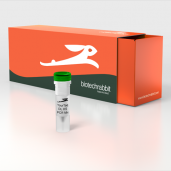
2X YourTaq™ Direct-Load Hot-Start PCR Master Mix
Package Sizes |
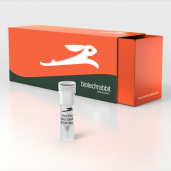
2X YourTaq™ Hot-Start PCR Master Mix
Package Sizes |
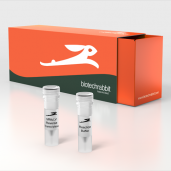
MMuLV Reverse Transcriptase, 200 U/µl
Package Sizes |
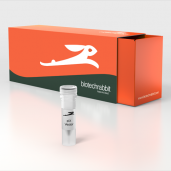
RTS pIX4.0 Insect Vector
Package Sizes |
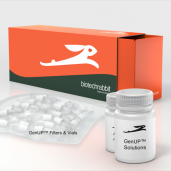
GenUP™ Virus DNA/RNA Kit
Package Sizes |
